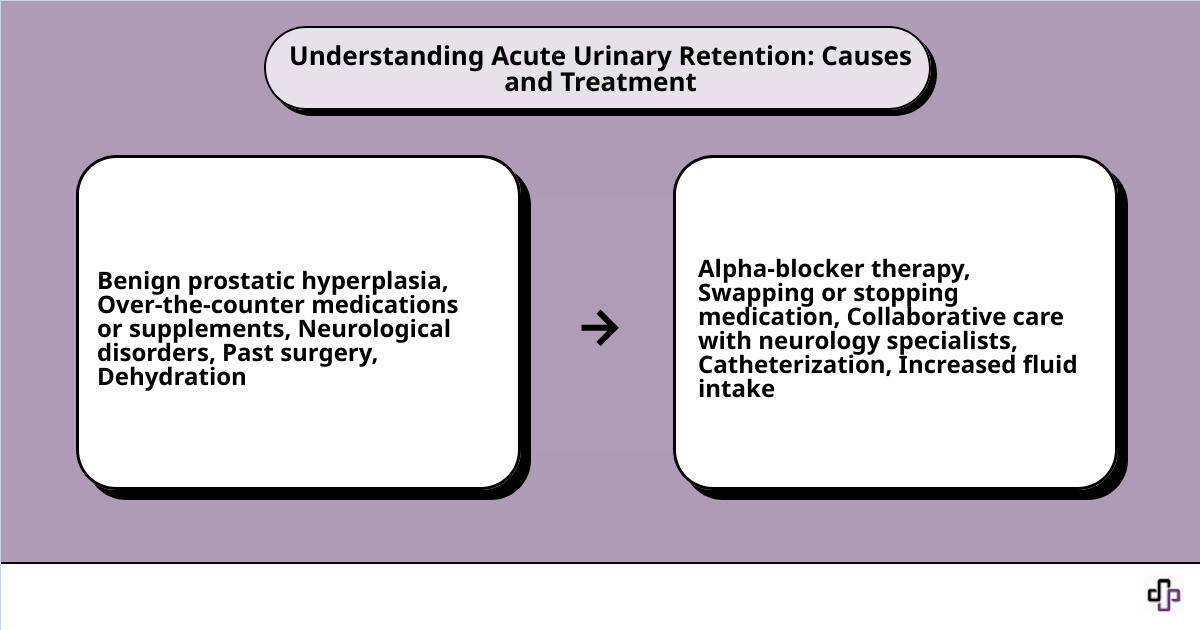Understanding Acute Urinary Retention: Causes and Treatment

Acute urinary retention, a severe and potentially life-altering health condition, is an intense and immediate inability to empty the bladder. For those grappling with this condition, daily lives are fraught with discomfort, distress, and the lurking fear of an urgent medical emergency. Here at ProMed DME, we believe in the power of knowledge - understanding the causes, symptoms, and treatments of this condition can make the experience significantly more bearable.
Urinary retention can stealthily creep into anyone's life, adding a debilitating layer of pain and uncertainty. Predominantly affecting men, benign prostatic hyperplasia being the culprit in 53% of cases, it can be influenced by an array of factors such as obstruction, inflammation, certain medications, and even neurological disorders. But fear not - it may be a daunting problem, but it's not an unsolvable one. An informed patient is an empowered patient, and we're here, hand-in-hand, to demystify the monster.
Beyond injurious impact on quality of life, untreated urinary retention poses serious health risks, including urinary tract infections, bladder damage, kidney damage, and urinary incontinence. That's why seeking timely medical intervention is crucial. Here's a rapid rundown of the causes and treatments to help you navigate this medical challenge:
| Risk Factors | Potential Treatments |
|---|---|
| Benign prostatic hyperplasia | Alpha-blocker therapy |
| Over-the-counter medications or supplements | Swapping or stopping medication |
| Neurological disorders | Collaborative care with neurology specialists |
| Past surgery | Catheterization |
| Dehydration | Increased fluid intake |

Understanding and managing acute urinary retention is more than a matter of knowledge - it's about reclaiming one's independence, comfort, and quality of life. Your health is in your hands, and we're here at ProMed DME to support you every step of the way - because you're not just patients to us, you're family.
Understanding Urinary Retention
Urinary retention might sound like a complex medical term, but it's a condition that's relatively easy to understand. It's important to distinguish between the different types of urinary retention and to know how prevalent this condition is in our society.
Definition of Urinary Retention
Urinary retention is a condition where you are unable to fully empty your bladder. Despite having the urge to urinate, some or all of the urine remains in your bladder, creating discomfort and potential health complications. It's not a disease in itself, but often a symptom or side effect of other health issues like prostate problems in men or cystocele in women.
Difference between Acute and Chronic Urinary Retention
There are two main types of urinary retention: acute and chronic. Acute urinary retention is sudden and severe. It happens when you are unable to urinate at all, even though your bladder is full. This condition can cause severe pain and can be life-threatening, requiring immediate medical attention.
On the other hand, chronic urinary retention is a more gradual condition. People with chronic urinary retention can urinate, but they cannot completely empty their bladders. Many may not even realize they have this condition, as it can often be asymptomatic.
Prevalence of Acute Urinary Retention in Different Demographics
Now that we've understood what urinary retention is, let's delve into its prevalence. Acute urinary retention is more common in older men. In a span of five years, about 1 in 10 men over 70 years old and almost 1 in 3 men in their 80s will develop acute urinary retention.
In contrast, acute urinary retention is much less common in women, with about 3 in 100,000 women developing the condition each year. In children, this condition is considered rare.
Chronic urinary retention, on the other hand, is less well-studied, and researchers aren't entirely sure how common it is. However, it's known that it tends to affect older men more than any other group.
Understanding urinary retention is the first step towards managing it effectively. At ProMed DME, we are dedicated to providing you with the information and resources you need to navigate this condition, ensuring you can live your life to the fullest. Remember, you're not alone in this journey. We're here with you every step of the way.
Causes of Acute Urinary Retention
Urinary retention, especially the acute type, can be a distressing and potentially dangerous condition. But what exactly causes this sudden inability to urinate despite a full bladder? Let's delve deeper into the primary causes of acute urinary retention.
Obstruction or Stricture in or Around the Bladder
One of the most common causes of acute urinary retention (AUR) is an obstruction or stricture in the urinary tract, which can partially or fully prevent urine from leaving your bladder. This obstruction might be due to benign prostatic hyperplasia in men, pelvic organ prolapse in women, or bladder stones in both sexes. Uncommonly, foreign bodies or tumors causing extrinsic compression can also result in urinary retention.
Weak Muscles in or Around the Bladder
Sometimes, the muscles in or around the bladder might become weak and fail to generate a strong enough force to expel all the urine. This muscle weakness can happen due to various reasons, including neurological disorders, muscle wasting conditions, or even aging.
Impact of Certain Medications on Urinary Retention
Certain medications, particularly those with anticholinergic side effects, can also lead to AUR. These medications block the parasympathetic muscarinic receptors in the bladder's detrusor muscle, leading to impaired detrusor contractility. Alpha-adrenergic agonists, such as decongestants, can increase tone in the prostate and bladder neck, while calcium channel blockers can reduce smooth muscle contractility in the bladder.
Dehydration and Constipation as Potential Causes
Dehydration and constipation can also contribute to urinary retention. Dehydration can lead to decreased urine production, which can contribute to bladder dysfunction. On the other hand, constipation can cause physical obstruction of the urinary tract or put pressure on the bladder, both of which can prevent normal urine flow.
Role of Tumors in Causing Urinary Retention
Certain types and locations of tumors can also cause urinary retention. For example, a tumor in the prostate can block the urethra in men, while gynecologic malignancies can cause physical obstruction in women. In some cases, even bladder tumors can lead to urinary retention.
Understanding the causes of acute urinary retention is the first step towards effective treatment and prevention. At ProMed DME, we are committed to helping you manage this condition, be it through our wide range of high-quality incontinence supplies or our expert advice. We believe that with the right knowledge and resources, you can overcome this condition and lead a healthy and comfortable life.
Symptoms and Diagnosis of Acute Urinary Retention
Acute urinary retention is an alarming condition that can strike suddenly. It's crucial to familiarize yourself with the signs and symptoms, so you can seek immediate medical help if necessary.
Common Symptoms of Acute Urinary Retention
The most noticeable symptom of acute urinary retention is the sudden inability to urinate, even when the urge is there and the bladder feels full. This can cause severe discomfort or pain in the lower belly. At times, the pain can even be life-threatening if not addressed promptly. It's important to note that acute urinary retention requires immediate medical attention.
How Acute Urinary Retention is Diagnosed
Diagnosing acute urinary retention involves a thorough physical examination, such as an abdominal assessment and a detailed history of the symptoms. The medical professional might also palpate and percuss the bladder to check for distention. Additionally, laboratory tests such as urinalysis might be conducted to rule out infection or other urinary disorders.
One of the key diagnostic tests is the postvoid residual (PVR) urine evaluation. This test measures the volume of urine left in the bladder after urination and can be performed using ultrasonography. In cases of acute urinary retention, the PVR urine volume is typically high, indicating that the bladder isn't emptying completely. If the PVR evaluation cannot provide accurate results, the patient may be catheterized to measure stored urine and decompress the bladder.
Importance of Early Diagnosis
Early diagnosis of acute urinary retention is crucial for effective treatment and to prevent complications. If left untreated, this condition can lead to urinary tract infections, bladder damage, or kidney damage. Furthermore, untreated urinary retention can increase the risk of bladder stones and reduce bladder function over time.
At ProMed DME, we understand the importance of early diagnosis and treatment. Our registered nurse on staff can provide guidance on the best incontinence supplies to manage symptoms, making the management of acute urinary retention easier and more comfortable.
Remember, the sooner you get a diagnosis, the sooner you can start treatment and return to your normal life. Don't hesitate to seek medical help if you experience any symptoms of acute urinary retention.
Treatment Options for Acute Urinary Retention
If you're diagnosed with acute urinary retention, there's no need to panic. There are several treatment options available that can help relieve your symptoms and improve your quality of life. Let's delve into these potential solutions.
Emergency Medical Treatment for Severe Cases
In severe cases of acute urinary retention, where the inability to urinate causes significant discomfort and pain, immediate medical attention is necessary. The most common emergency treatment involves the insertion of a catheter, a thin flexible tube, into the bladder to allow urine to flow. At ProMed DME, we offer a range of high-quality catheter products, including Coude catheters, Foley catheters, and straight tip catheters. Coude catheters, for example, feature a slightly curved tip that can assist in inserting past a blockage, aiding in the immediate relief of symptoms.
Role of Pelvic Floor Muscle Exercises (Kegel Exercises)
Pelvic floor muscle exercises, commonly known as Kegel exercises, can be a valuable tool in the management of urinary retention. These exercises strengthen the muscles that you use to empty your bladder, improving their ability to contract and relax effectively. Regular practice of these exercises under the guidance of a healthcare professional can help you gain control over your urinary retention symptoms.
Importance of Physical Therapy in Managing Symptoms
Physical therapy can also play a vital role in managing the symptoms of acute urinary retention. Therapists can teach techniques and exercises designed to improve bladder function and control, such as bladder training, biofeedback, and electrical stimulation. Furthermore, physical therapy can also help address any underlying issues that may contribute to urinary retention, such as muscle weakness or nerve dysfunction.
Medications Used in the Treatment of Acute Urinary Retention
Several medications can be used to treat acute urinary retention, depending on the underlying cause. For instance, alpha-blockers can relax the muscles around the bladder and prostate, making it easier to urinate. Other medications can reduce the size of the prostate or calm overactive bladder muscles. As always, it's essential to discuss these options with your healthcare provider to determine the best treatment plan for your specific situation.
At ProMed DME, we understand that dealing with acute urinary retention can be challenging. But with the right treatment plan and support, you can effectively manage your symptoms and improve your overall quality of life. Whether you need high-quality medical supplies, advice on exercise techniques, or guidance on managing your condition, we're here to help every step of the way.
Prevention and Management of Acute Urinary Retention
In the battle against acute urinary retention (AUR), prevention is your best defense. By understanding the triggers and making lifestyle changes, you can significantly reduce your risk and manage the symptoms effectively. Let's delve into some strategies for preventing and managing AUR.
Importance of Staying Hydrated
Preventing urinary retention starts with something as simple as staying hydrated. It's a common misconception that drinking less water will decrease the chances of urinary retention. On the contrary, maintaining a proper hydration level is crucial in keeping your urinary system functioning optimally.
Dehydration can lead to concentrated urine, which may irritate the bladder and increase the risk of urinary retention. The amount of water intake required can vary based on factors like your geographical location, activity level, and age. But generally, you should aim for at least eight glasses a day.
Lifestyle Changes to Prevent Urinary Retention
Lifestyle changes can significantly influence your urinary health. Regular physical activity, for instance, can enhance bladder function and reduce the risk of urinary retention. Pelvic floor exercises (also known as Kegel exercises) can strengthen the muscles that play a vital role in bladder control.
Diet is another key factor. Aim for a diet rich in fiber to prevent constipation, which can contribute to urinary retention. Avoid bladder irritants such as caffeine, alcohol, and spicy foods, which can exacerbate symptoms.
Moreover, if you're using catheters, proper catheter care is critical. This includes washing your hands before and after cathing, using a perineal cleanser, and never reusing a catheter. At ProMed DME, we offer a comprehensive range of high-quality catheter products and user guides to help you maintain optimal urinary health.
Role of Regular Medical Check-ups in Managing Urinary Retention
Regular medical check-ups can help prevent urinary retention and its complications. These check-ups can detect any blockages, strictures, or weaknesses in your bladder or urethra, allowing for early intervention.
For people with certain neurologic conditions, such as multiple sclerosis and Parkinson disease, regular follow-ups with a neurologist and urologist are especially crucial to prevent acute urinary retention.
At ProMed DME, we're committed to supporting you on your journey to better urinary health. Whether you need advice on lifestyle changes, high-quality medical supplies, or guidance on managing your condition, we're with you every step of the way.
With the right knowledge and resources, you can effectively prevent and manage acute urinary retention, leading to an improved quality of life. So, keep hydrated, prioritize a healthy lifestyle, and never underestimate the value of regular medical check-ups.

Conclusion
As we reach the end of our discussion on acute urinary retention, let's take a moment to reflect on what we've learned. Acute urinary retention is a serious condition that requires immediate medical attention. It's caused by a range of factors from obstruction or stricture in or around the bladder, weak muscles, certain medications, to dehydration and constipation. The symptoms can be distressing, but with the right diagnosis and treatment, it can be effectively managed.
Here at ProMed DME, we understand that dealing with acute urinary retention can be challenging. However, we also believe that with the right information and support, you can navigate this condition effectively. We encourage anyone experiencing symptoms of acute urinary retention to seek medical help promptly. Early diagnosis and treatment are key to managing this condition and preventing complications.
While we've provided an overview of causes, symptoms, and treatments, it's always essential to consult with a healthcare professional for accurate diagnosis and personalized treatment plan. Don't hesitate to reach out to your healthcare provider if you have any concerns regarding urinary retention.
Apart from medical interventions, we emphasize the importance of patient education in managing acute urinary retention. Being informed about your condition is empowering. It allows you to make informed decisions about your health and to actively participate in your treatment plan.
At ProMed DME, we're committed to providing high-quality urology products, including a range of catheters, to assist in managing conditions like acute urinary retention. Our registered nurse on staff can guide you on how to use these supplies safely, ensuring you get the best care possible.
Acute urinary retention may be a daunting diagnosis, but remember, you're not alone in this journey. We're here to provide the support, resources, and products you need to effectively manage your condition and maintain your quality of life. Stay informed, stay positive, and stay proactive in your health journey.

Related Resources & Articles
Stay informed with our informative blog posts.
Discover the ProMed Advantage
& Try Our Products
We offer free shipping and legendary customer service to ensure you receive the
best DME products for your needs.




